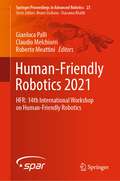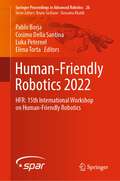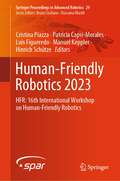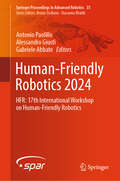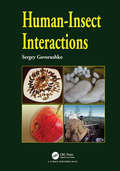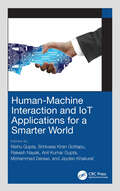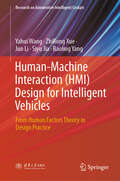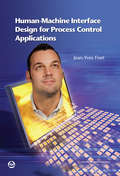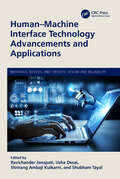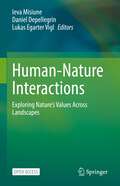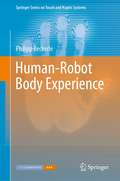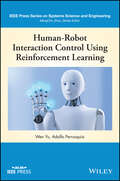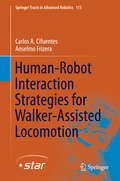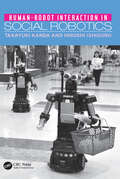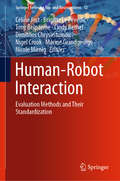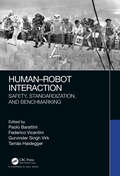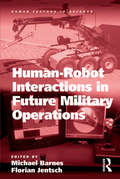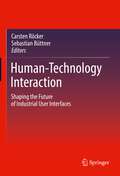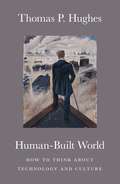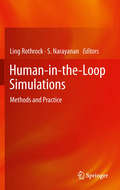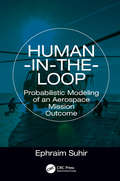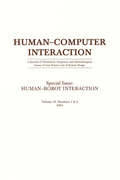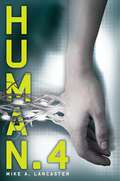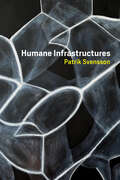- Table View
- List View
Human-Friendly Robotics 2021: HFR: 14th International Workshop on Human-Friendly Robotics (Springer Proceedings in Advanced Robotics #23)
by Gianluca Palli Claudio Melchiorri Roberto MeattiniThis book is a collection of research results in a wide range of topics related to human–robot interaction, both physical and cognitive, including theories, methodologies, technologies, and empirical and experimental studies. The works contained in the book have been presented at the 14th International Workshop on Human-Friendly Robotics (HFR 2021), organized by the University of Bologna (Bologna, Italy, October 28–29, 2021), and they describe the most original achievements in the field of human–robot interaction coming from the ideas of young researchers. The intended readership of the book is any researcher in the field of robotics interested to research problems related to human–robot coexistence, like robot interaction control, robot learning, and human–robot co-working.
Human-Friendly Robotics 2022: HFR: 15th International Workshop on Human-Friendly Robotics (Springer Proceedings in Advanced Robotics #26)
by Pablo Borja Cosimo Della Santina Luka Peternel Elena TortaThis book contains seventeen contributions in the form of independent chapters, covering a broad range of topics related to human–robot interaction at physical and cognitive levels. Each chapter represents a novel piece of work presented during HFR 2022 by researchers in the different areas of robotics, where new theories, methodologies, technologies, challenges, and empirical and experimental studies are discussed. Additionally, this compilation is rich in viewpoints due to the multidisciplinary nature of its authors. Hence, this book represents an excellent opportunity for academics, researchers, and industry partners to get acquainted with the most recent work on human–robot interaction.
Human-Friendly Robotics 2023: HFR: 16th International Workshop on Human-Friendly Robotics (Springer Proceedings in Advanced Robotics #29)
by Hinrich Schütze Cristina Piazza Patricia Capsi-Morales Luis Figueredo Manuel KepplerComprising sixteen independent chapters, this book covers recent advancements and emerging pathways within human-friendly robotics on physical and cognitive levels. Each chapter presents a novel work presented at HFR 2023 by researchers from various robotic domains, where new theories, methodologies, technologies, challenges, and empirical and experimental studies are discussed. The multidisciplinary nature of the authors enriches the compilation with varied viewpoints, making it an excellent resource for academics, researchers, and industry professionals to get acquainted with the state of the art on human-robot interaction.
Human-Friendly Robotics 2024: HFR: 17th International Workshop on Human-Friendly Robotics (Springer Proceedings in Advanced Robotics #35)
by Antonio Paolillo Alessandro Giusti Gabriele AbbateThis book covers a wide range of topics related to human-robot interaction, both physical and cognitive, including theories, methodologies, technologies, and experimental studies. An increasing number of robots operate closely with humans and are expected to interact with people in everyday life, such as patients in hospitals, children in schools, or elderly people in domestic environments. New generations of human-friendly robots must meet the needs of these non-expert users, ensuring safety and trustworthiness both physically and cognitively. To realize this vision, the International Workshop on Human-Friendly Robotics (HFR) provides an opportunity for academic, research, and industry experts to exchange and share their experiences and achievements related to the integration of robots into everyday life. The 17th edition of HFR took place in Lugano, Switzerland, on September 30 and October 1, 2024, and organized by Dalle Molle Institute for Artificial Intelligence (IDSIA), USI-SUPSI.
Human-Insect Interactions
by Sergey GovorushkoThis book presents a 360-degree picture of the world of insects and explores how their existence affects our lives: the "good, bad, and ugly" aspects of their interactions with humankind. It provides a lucid introductory text for beginning undergraduate students in the life sciences, particularly those pursuing beginner courses in entomology, agriculture, and botany.
Human-Like Decision Making and Control for Autonomous Driving
by Chen Lv Peng Hang Xinbo ChenThis book details cutting-edge research into human-like driving technology, utilising game theory to better suit a human and machine hybrid driving environment. Covering feature identification and modelling of human driving behaviours, the book explains how to design an algorithm for decision making and control of autonomous vehicles in complex scenarios. Beginning with a review of current research in the field, the book uses this as a springboard from which to present a new theory of human-like driving framework for autonomous vehicles. Chapters cover system models of decision making and control, driving safety, riding comfort and travel efficiency. Throughout the book, game theory is applied to human-like decision making, enabling the autonomous vehicle and the human driver interaction to be modelled using noncooperative game theory approach. It also uses game theory to model collaborative decision making between connected autonomous vehicles. This framework enables human-like decision making and control of autonomous vehicles, which leads to safer and more efficient driving in complicated traffic scenarios. The book will be of interest to students and professionals alike, in the field of automotive engineering, computer engineering and control engineering.
Human-Machine Interaction and IoT Applications for a Smarter World
by Nishu GuptaHuman-Machine Interaction and IoT Applications for a Smarter World explores the futuristic trends at the cutting edge of study and research on Human-Machine Interaction (HMI), which is also known as Human-Computer Interface (HCI), and the Internet of Things (IoT) by featuring applications in a proficient, adaptable, and manageable way. It covers the mainstays of the IoT world through a thorough description of the present advancements, systems, and structures. This book: Discusses algorithms and design methodologies for the implementation of HMI based IoT systems. Covers real-time utility of IoT-based devices and systems. Provides human-machine interactive technologies and smart applications using IoT. Covers cyber-physical systems and IoT in HMI, using a blend of theoretical knowledge with a practical approach. It also covers important concepts including smart grid and energy consumption monitoring, smart vehicular and transportation systems, smart home automation, automatic identification systems, supervisory control and data acquisition systems, designing and integrating heterogeneous Human-Machine interactions, virtual and augmented reality, natural language processing, computer vision, and automatic speech recognition. This text will be useful for senior undergraduate, graduate students, and academic researchers in areas including electrical, electronics, and communications engineering, as well as computer science.
Human-Machine Interaction: From Human Factors Theory to Design Practice (Research on Automotive Intelligent Cockpit)
by Jun Li Yahui Wang ZhiRong Xue Siyu Jia Baoling YangThis book details the knowledge of digital instrumentation human–machine interaction (HMI) design, infotainment system HMI design, multi-mode interaction design, and driving automation HMI design in intelligent vehicles from the perspective of human factors engineering. It explains the design methodology of intelligent vehicle systems, intelligent driving, and multi-mode interaction from multiple perspectives, covering ergonomics theory, industry specifications, design cases, design principles, trends, and challenges in related fields. This book is suitable for automotive user experience (UX) and HMI designers, product managers, etc. It is also used as a textbook or reference book for automotive design, human–computer interaction design, and other related courses in higher education institutions.
Human-Machine Interface Design for Process Control Applications
by Jean-Yves FisetIdeal for users and designers of industrial control and monitoring systems, this book provides an easy-to-use, yet effective, method to configure, design, and validate human-machine interfaces (HMIs). Such systems include distributed control systems (DCSs); supervisory control and data acquisition systems (SCADAs); and stand-alone units. This book also discusses the overall HMI design process; how that process relates to system design; detailed design methods, principles, and rules for individual displays and groups of displays; and integrating both software-based and hardwired HMIs.
Human-Machine Interface Technology Advancements and Applications (Materials, Devices, and Circuits)
by Ravichander Janapati, Usha Desai, Shrirang Ambaji Kulkarni, and Shubham TayalHuman–Machine Interface Technology Advancements and Applications focuses on analysis, design, and evaluation perspectives in HMI technological breakthroughs and applications. It covers a wide range of ideas, methodologies, approaches, and instruments to give the reader a thorough understanding of the field's current academic and industry practice and debate. Physical, cognitive, social, and emotional factors are all considered in the work, which is exemplified by key application fields such as aerospace, automobile, medicine, and defense. This book covers AI and machine learning methodologies as well as biological signals and HMI applications. Nanotechnology, user interface design, and interactive systems are also featured. The MATLAB approach to signal processing applications is also included.This book discusses advances in the field of human–machine interfaces and provides practical knowledge in biomedical signal processing, AI, and machine learning. It discusses augmented reality/virtual reality-based HMI applications. It examines advances in nanotechnology, user interface design, and interactive systems.This book is intended to serve as a research guide that will both inform readers about the fundamentals of HMI from academic and industrial perspectives and provide a glimpse into how human-centered designers, such as engineers and human factors specialists, will attempt to design and develop human–machine systems in the future.
Human-Nature Interactions: Exploring Nature’s Values Across Landscapes
by Ieva Misiune Daniel Depellegrin Lukas Egarter ViglThis edited volume aims to widen the discussion about the diversity of human-nature relationships and valuation methods and to stimulate new perspective that are needed to build a more sustainable future, especially in face of ongoing socio-environmental changes. Conceptual and empirical approaches, including qualitative, quantitative, and mixed methodologies have been used to highlight the importance of an integrative understanding of socio-ecological systems, where healthy ecosystems underpin the quality of life and societal activities largely drive environmental changes. Readers will obtain a comprehensive overview of the many and diverse ways the relationships between people and nature can be characterized. This includes understanding how people assign values to nature, discuss how human-nature interactions are shaped and provide examples of how these values and interactions can be systematically assessed across different land systems in Europe and beyond. This open access book is produced by internationally recognized scientists in the field but written in an accessible format to be of interest to a large audience, including prospective students, lecturers, young professionals and scientists embarking to the interdisciplinary field of socio-ecological research and environmental valuation.
Human-Robot Body Experience (Springer Series on Touch and Haptic Systems)
by Philipp BeckerleThis monograph presents innovative research regarding the body experience of human individuals who are using assistive robotic devices such as wearable robots or teleoperation systems. The focus is set on human-in-the-loop experiments that help to empirically evaluate how users experience devices. Moreover, these experiments allow for further examination of the underlying mechanisms of body experience through extending existing psychological paradigms, e.g., by disentangling tactile feedback from contacts. Besides reporting and discussing psychological examinations, the influence of various aspects of engineering design is investigated, e.g., different implementations of haptic interfaces or robot control. As haptics are of paramount importance in this tight type of human-robot interaction, it is explored with respect to modality as well as temporal and spatial effects. The first part of the book motivates the research topic and gives an in-depth analysis of the experimental requirements. The second and third part present experimental designs and studies of human-robot body experience regarding the upper and lower limbs as well as cognitive models to predict them. The fourth part discusses a multitude of design considerations and provides directions to guide future research on bidirectional human-machine interfaces and non-functional haptic feedback.
Human-Robot Interaction Control Using Reinforcement Learning (IEEE Press Series on Systems Science and Engineering)
by Wen Yu Adolfo PerrusquiaA comprehensive exploration of the control schemes of human-robot interactions In Human-Robot Interaction Control Using Reinforcement Learning, an expert team of authors delivers a concise overview of human-robot interaction control schemes and insightful presentations of novel, model-free and reinforcement learning controllers. The book begins with a brief introduction to state-of-the-art human-robot interaction control and reinforcement learning before moving on to describe the typical environment model. The authors also describe some of the most famous identification techniques for parameter estimation. Human-Robot Interaction Control Using Reinforcement Learning offers rigorous mathematical treatments and demonstrations that facilitate the understanding of control schemes and algorithms. It also describes stability and convergence analysis of human-robot interaction control and reinforcement learning based control. The authors also discuss advanced and cutting-edge topics, like inverse and velocity kinematics solutions, H2 neural control, and likely upcoming developments in the field of robotics. Readers will also enjoy: A thorough introduction to model-based human-robot interaction control Comprehensive explorations of model-free human-robot interaction control and human-in-the-loop control using Euler angles Practical discussions of reinforcement learning for robot position and force control, as well as continuous time reinforcement learning for robot force control In-depth examinations of robot control in worst-case uncertainty using reinforcement learning and the control of redundant robots using multi-agent reinforcement learning Perfect for senior undergraduate and graduate students, academic researchers, and industrial practitioners studying and working in the fields of robotics, learning control systems, neural networks, and computational intelligence, Human-Robot Interaction Control Using Reinforcement Learning is also an indispensable resource for students and professionals studying reinforcement learning.
Human-Robot Interaction Strategies for Walker-Assisted Locomotion
by Carlos A. Cifuentes Anselmo FrizeraThis book presents the development of a new multimodal human-robot interface for testing and validating control strategies applied to robotic walkers for assisting human mobility and gait rehabilitation. The aim is to achieve a closer interaction between the robotic device and the individual, empowering the rehabilitation potential of such devices in clinical applications. A new multimodal human-robot interface for testing and validating control strategies applied to robotic walkers for assisting human mobility and gait rehabilitation is presented. Trends and opportunities for future advances in the field of assistive locomotion via the development of hybrid solutions based on the combination of smart walkers and biomechatronic exoskeletons are also discussed.
Human-Robot Interaction in Social Robotics
by Hiroshi Ishiguro Takayuki KandaHuman–Robot Interaction in Social Robotics explores important issues in designing a robot system that works with people in everyday environments. Edited by leading figures in the field of social robotics, it draws on contributions by researchers working on the Robovie project at the ATR Intelligent Robotics and Communication Laboratories, a world leader in humanoid interactive robotics. The book brings together, in one volume, technical and empirical research that was previously scattered throughout the literature. Taking a networked robot approach, the book examines how robots work in cooperation with ubiquitous sensors and people over telecommunication networks. It considers the use of social robots in daily life, grounding the work in field studies conducted at a school, train station, shopping mall, and science museum. Critical in the development of network robots, these usability studies allow researchers to discover real issues that need to be solved and to understand what kinds of services are possible. The book tackles key areas where development is needed, namely, in sensor networks for tracking humans and robots, humanoids that can work in everyday environments, and functions for interacting with people. It introduces a sensor network developed by the authors and discusses innovations in the Robovie humanoid, including several interactive behaviors and design policies. Exploring how humans interact with robots in daily life settings, this book offers valuable insight into how robots may be used in the future. The combination of engineering, empirical, and field studies provides readers with rich information to guide in developing practical interactive robots.
Human-Robot Interaction: Evaluation Methods and Their Standardization (Springer Series on Bio- and Neurosystems #12)
by Céline Jost Brigitte Le Pévédic Tony Belpaeme Cindy Bethel Dimitrios Chrysostomou Nigel Crook Marine Grandgeorge Nicole MirnigThis book offers the first comprehensive yet critical overview of methods used to evaluate interaction between humans and social robots. It reviews commonly used evaluation methods, and shows that they are not always suitable for this purpose. Using representative case studies, the book identifies good and bad practices for evaluating human-robot interactions and proposes new standardized processes as well as recommendations, carefully developed on the basis of intensive discussions between specialists in various HRI-related disciplines, e.g. psychology, ethology, ergonomics, sociology, ethnography, robotics, and computer science. The book is the result of a close, long-standing collaboration between the editors and the invited contributors, including, but not limited to, their inspiring discussions at the workshop on Evaluation Methods Standardization for Human-Robot Interaction (EMSHRI), which have been organized yearly since 2015. By highlighting and weighing good and bad practices in evaluation design for HRI, the book will stimulate the scientific community to search for better solutions, take advantages of interdisciplinary collaborations, and encourage the development of new standards to accommodate the growing presence of robots in the day-to-day and social lives of human beings.
Human-Robot Interaction: Safety, Standardization, and Benchmarking
by Gurvinder Singh Virk Paolo Barattini Federico Vicentini Tamas HaideggerHuman-Robot Interaction: Safety, Standardization, and Benchmarking provides a comprehensive introduction to the new scenarios emerging where humans and robots interact in various environments and applications on a daily basis. The focus is on the current status and foreseeable implications of robot safety, approaching these issues from the standardization and benchmarking perspectives. Featuring contributions from leading experts, the book presents state-of-the-art research, and includes real-world applications and use cases. It explores the key leading sectors—robotics, service robotics, and medical robotics—and elaborates on the safety approaches that are being developed for effective human-robot interaction, including physical robot-human contacts, collaboration in task execution, workspace sharing, human-aware motion planning, and exploring the landscape of relevant standards and guidelines. <P><P>Features <P><P>Presenting a comprehensive introduction to human-robot interaction in a number of domains, including industrial robotics, medical robotics, and service robotics <P><P>Focusing on robot safety standards and benchmarking <P><P>Providing insight into current developments in international standards <P><P>Featuring contributions from leading experts, actively pursuing new robot development
Human-Robot Interactions in Future Military Operations (Human Factors in Defence)
by Florian JentschSoldier-robot teams will be an important component of future battle spaces, creating a complex but potentially more survivable and effective combat force. The complexity of the battlefield of the future presents its own problems. The variety of robotic systems and the almost infinite number of possible military missions create a dilemma for researchers who wish to predict human-robot interactions (HRI) performance in future environments. Human-Robot Interactions in Future Military Operations provides an opportunity for scientists investigating military issues related to HRI to present their results cohesively within a single volume. The issues range from operators interacting with small ground robots and aerial vehicles to supervising large, near-autonomous vehicles capable of intelligent battlefield behaviors. The ability of the human to 'team' with intelligent unmanned systems in such environments is the focus of the volume. As such, chapters are written by recognized leaders within their disciplines and they discuss their research in the context of a broad-based approach. Therefore the book allows researchers from differing disciplines to be brought up to date on both theoretical and methodological issues surrounding human-robot interaction in military environments. The overall objective of this volume is to illuminate the challenges and potential solutions for military HRI through discussion of the many approaches that have been utilized in order to converge on a better understanding of this relatively complex concept. It should be noted that many of these issues will generalize to civilian applications as robotic technology matures. An important outcome is the focus on developing general human-robot teaming principles and guidelines to help both the human factors design and training community develop a better understanding of this nascent but revolutionary technology. Much of the research within the book is based on the Human Research and Engineering Directorate (HRED), U.S. Army Research Laboratory (ARL) 5-year Army Technology Objective (ATO) research program. The program addressed HRI and teaming for both aerial and ground robotic assets in conjunction with the U.S. Army Tank and Automotive Research and Development Center (TARDEC) and the Aviation and Missile Development Center (AMRDEC) The purpose of the program was to understand HRI issues in order to develop and evaluate technologies to improve HRI battlefield performance for Future Combat Systems (FCS). The work within this volume goes beyond the research results to encapsulate the ATO's findings and discuss them in a broader context in order to understand both their military and civilian implications. For this reason, scientists conducting related research have contributed additional chapters to widen the scope of the original research boundaries.
Human-Technology Interaction: Shaping the Future of Industrial User Interfaces
by Carsten Röcker Sebastian BüttnerDigitalization and automation are leading to fundamental changes in the industrial landscape. In the German-speaking countries, this development is often summarized under the term Industry 4.0. Simultaneously, interaction technologies have made huge developments in the last decades. The use of mobile devices and touch screens is ubiquitous, augmented and virtual reality technologies have made their way into the market and new interaction concepts have become established. While new interaction technologies offer new possibilities for organizing or executing work in the context of Industry 4.0, the transformation of industrial processes also creates a need for new work practices. This book sheds light on the interplay of Industry 4.0 and new interaction technologies. It presents selected research articles on the topic of Human-Technology Interaction in the context of Industry 4.0. Researchers from various disciplines present the current state of research with regard to future interactions with production environments to develop a common vision of how to design future interactions in the industrial domain. In this context, various topics are covered: a detailed overview on assistive systems for supporting manual work is given, including technological and design aspects as well as implementation strategies. Industrial use-cases for extended reality (XR) technologies such as augmented and virtual reality (AR and VR) are presented, also covering aspects of how to author content in XR environments. The role of new work practices is examined, for example, by presenting concepts of gamification and human-machine teamwork for supporting well-being. Finally, topics of trust and technology acceptance are discussed in the context of Industry 4.0. Given this broad perspective, a vision is sketched of how to design future human-technology interactions in a way that realizes their full technical and human potential.
Human-built World: How to Think About Technology and Culture
by Thomas HughesA Pulitzer Prize-nominated science writer draws on literature, art, and architecture to explore what technology has brought to society and culture, and to explain how technology can work with, not against, ecological concerns.
Human-in-the-Loop Simulations
by S. Narayanan Ling RothrockHuman-in-the-Loop Simulations is a compilation of articles from experts in the design, development, and use of human-in-the-loop simulations. The first section of the handbook consists of papers on fundamental concepts in human-in-the-loop simulations, such as object-oriented simulation development, interface design and development, and performance measurement. The second section includes papers from researchers who utilized HITL simulations to inform models of cognitive processes to include decision making and metacognition. The last section describes human-in-the-loop processes for complex simulation models in trade space exploration and epidemiological analyses. Human-in-the-Loop Simulations is a useful tool for multiple audiences, including graduate students and researchers in engineering and computer science.
Human-in-the-Loop: Probabilistic Modeling of an Aerospace Mission Outcome
by Ephraim SuhirImprovements in safety in the air and in space can be achieved through better ergonomics, better work environments, and other efforts of traditional avionic psychology that directly affect human behaviors and performance. Not limited to just the aerospace field, this book discusses adaptive probabilistic predictive modeling in human-in-the-loop situations and gets you familiar with a new, powerful, flexible, and effective approach to making outcomes from missions successful and safe. Covers the concepts, which are adaptable across other disciplines, and methodology for evaluating the likelihood of a successful outcome of an extraordinary situation Considers human performance and equipment/instrumentation reliability, as well as other possible sources of uncertainty Presents probabilistic assessment of an aerospace mission outcome Provides the most effective, physically meaningful, and cost-effective planning of an aerospace mission Offers how to organize and provide the most effective training of personnel
Human-robot Interaction: A Special Double Issue of human-computer Interaction
by Human-Robot InteractionThis special issue is made up of five articles which cover the emerging area of human-robot interaction. The first paper offers a theoretical ecological framework for the design of personal service robots in homes of elderly people. Next, a field study of two robots that visited a children's elementary school in Japan for two weeks, with the purpos
Human.4
by Mike A. LancasterKyle Straker volunteered to be hypnotized at the annual community talent show, expecting the same old lame amateur acts. But when he wakes up, his world will never be the same. Televisions and computers no longer work, but a strange language streams across their screens. Everyone's behaving oddly. It's as if Kyle doesn't exit. Is this nightmare a result of the hypnosis? Will Kyle wake up with a snap of fingers to roars of laughter? Or is this something much more sinister? Narrated on a set of found cassette tapes at an unspecified point in the future, Human.4 is an absolutely chilling look at technology gone too far.
Humane Infrastructures (metaLAB Projects)
by Patrik SvenssonHow we can work together to understand, imagine, and build humane infrastructures and a better world.Humane Infrastructures is a deep journey into humanistic and humane knowledge and how it can be engaged to help us collaboratively respond in ethical and sustainable ways to our current global challenges. Patrik Svensson takes the reader through a series of examples, case studies, experiments, and lively dialogues to reconsider infrastructure. He brings people, ideas, and perspectives in through a set of documents and documented experiences, some of which draw from the author&’s practice in Umeå, Stockholm, New York City, and Los Angeles. And he proposes frameworks, such as the idea of an infrastructure clinic, exploring them in staged dialogues and thought experiments.Imagining and building humane infrastructures require us to challenge the very nature of infrastructure, not necessarily all at once but rather step by step. The author consequently engages with infrastructure as a concept and frames it historically, critically, and creatively with research infrastructure as a central case study. He also considers integrative niches for humanities-related work, such as environmental humanities and disability studies, as sites for critical and constructive engagement with infrastructures, including the university itself. In the end, the exploration leads to a reimagination of the humanities and, more generally, higher education as part of a capacious public-facing effort of world-(re)building.The book will appeal to scholars in the humanities and a range of intersecting fields, such as infrastructure studies, critical computing, and design.
